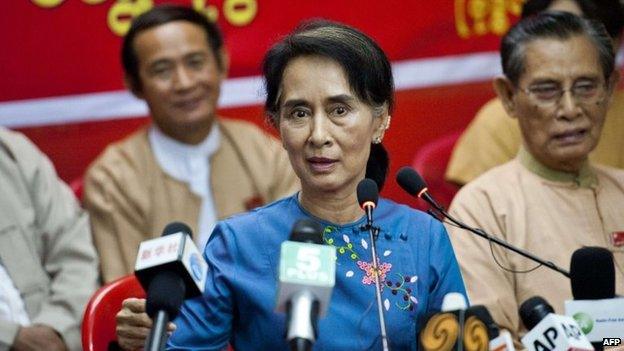China media: Suu Kyi visit to boost ties with Myanmar
- Published

Aung San Suu Kyi stood for election for the first time in 2012
Chinese media have welcomed Myanmar's opposition leader Aung San Suu Kyi, hoping that she will be "friendly" towards Beijing on her first visit to China.
Ms Suu Kyi, who arrived on Wednesday, will meet President Xi Jinping and Premier Li Keqiang, but no other details have been provided.
Some media outlets have commented that Beijing was reluctant to invite her in the past because of "ideological considerations".
"After Myanmar's democratisation, Ms Suu Kyi has reconciled with the government. As she has been elected as a legislator, naturally she can visit China in an official capacity," argues a commentary on Phoenix TV's website, external.
It adds that China "must also consider the possibility of her becoming president if Myanmar's military decides to amend the constitution so that Suu Kyi can run for president".
Relations between the countries have cooled in recent years, partly because of violence near their mutual border. Myanmar (also known as Burma) has been fighting rebels in its eastern Kokang region, which borders China's Yunnan province.
A commentary in the China Daily says her visit will play an important role in improving co-operation between the two countries.
"For many in Myanmar, the lack of grassroots and party-to-party exchanges between China and Myanmar and some Western media outlets' biased reports against China have created many misunderstandings," it says.
The commentary, external also stresses that Ms Suu Kyi's meetings with Chinese citizens will create an atmosphere of trust.
"The misconceptions between Chinese and Myanmar people are likely to reduce after Ms Suu Kyi spends five days meeting Chinese people from all walks of life," it says.
'Bigger signal'
Some papers and pundits argue that the CPC's decision to host Ms Suu Kyi is a signal for Myanmar's government that China is willing to work with all political players.
Shi Yinhong, a professor of international relations at the Renmin University, sees her visit against the backdrop of tensions on the border.
"China has sent an even bigger signal that it is upset with Myanmar's government," the Chinese language edition of the South China Morning Post, external quotes him as saying. By inviting Ms Suu Kyi to visit, he says: "China is telling the Myanmar government that if it doesn't maintain friendly ties with Beijing, China will build ties with all the political factions willing to be friendly towards China, regardless of whether they are in power or not."
Other pundits point out that China should leverage her popularity in Myanmar to its advantage.
"It is said Ms Suu Kyi enjoys very good reputation among the people of Myanmar. If China had continued to refuse to get in touch with her, it would have been China's loss," a commentary in Shanghai-based news portal Guancha.cn , externalsays.
Lin Xixing, an expert on Southeast Asian affairs from the Jinan University in Guangzhou, feels China can work with Ms Suu Kyi to end the conflict in northern Myanmar.
"China is becoming impatient because Myanmar ignores its protests over the clashes in northern part of Myanmar... Perhaps Suu Kyi can use her influence to put pressure on both parties to end the conflict," the Hong Kong-based pro-Beijing paper Ta Kung Pao quotes him as saying.
And finally, a commentary , externalon the Sohu news portal describes her as "an important symbol of Asian people fighting for freedom".
"China and Myanmar are like a family with long ties between the two peoples... We also hope Myanmar can start a new chapter of democratic and social development with a successful general election planned for October," it says.
BBC Monitoring reports and analyses news from TV, radio, web and print media around the world. You can follow BBC Monitoring on Twitter, external and Facebook, external.